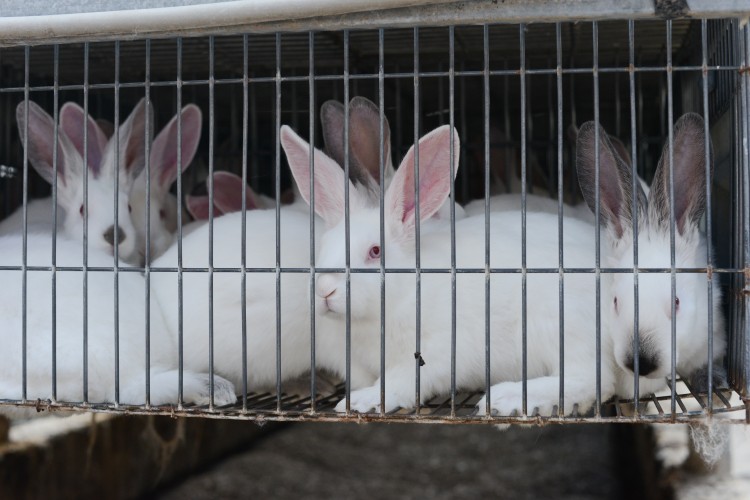In Australian media and public discussion around intensive farming practices there has been little attention given to rabbits farmed for meat. Caged layer hens on the other hand, who endure similar living conditions to farmed rabbits, have received at least some acknowledgement of their suffering.
As more and more Australians become aware of the welfare issues associated with factory farming, it’s time to shine a light on the suffering of these smart and sensitive beings.
Domestic rabbits are curious, affectionate animals who exhibit a range of behaviours and emotions. Their unique sensitivity and biology make them particularly vulnerable to the conditions they experience in intensive farm environments. In these systems, they are farmed intensively in wire cages for the duration of their short lives – an average of just 12 weeks.
They are provided with only 0.07m2 of space per rabbit, which is roughly the area of an A4 sheet of paper – a similar size to the battery cages used to house layer hens in the intensive egg industry. Rabbit ethology and behavioural studies have revealed that caging rabbits causes serious welfare issues including both physical and psychological suffering.

The lack of space and environmental enrichment prevents the natural expression of their most basic instincts, including standing on hind legs, hopping, digging, hiding, socialising, and nest building. Rabbits enjoy exploring, foraging and gnawing natural objects, and need to stretch out to thermoregulate – behaviours that are simply not possible in confined cage environments.
Their cages are fitted with wire floors, which restrict movement and can cause a host of physical issues, including splay legs, sore footpads, and paw injuries.
Housed indoors in sheds, caged rabbits are also subject to numerous environmental stressors, including temperature fluctuations, ammonia build-up, noise, and crowding. Understandably, these conditions can result in frustration, stress and psychological health problems, which can lead to abnormal behaviours including inactivity, biting cage corner bars, over-eating, excessive body grooming, frequent shaking of the head, and moving around in repeated circles.
EXPLORING THE ALTERNATIVES
It may seem that free-range farming systems could offer a higher welfare alternative. However, free-range is simply not an option for commercial scale rabbit farming in Australia.
As rabbits have been declared as ‘pests’ across all Australian jurisdictions, governments want to prevent farmed rabbits from escaping and possibly interbreeding with wild rabbits. Allowing them to freely range also increases the risk of contracting one of the various fatal viruses released by governmental agencies to control the wild rabbit population.
 Photo: Jo-Anne McArthur/Animal Equality.
Photo: Jo-Anne McArthur/Animal Equality.
Some farms around the world have opted for ‘enriched cages’, which provide farmed rabbits with slightly more space, height and environmental enrichment (such as gnawing sticks). Whilst enriched cages are certainly preferable to barren cages, they still fail to meet the full welfare needs of rabbits.
Both cage types deny rabbits their natural physiological and behavioural needs, including social contact and retreat, resting, playing, nest building, hiding, exploring, and foraging. And regardless of the production system used, all farmed rabbits are subject to the same slaughter standards, which concerningly lack consistency across Australian jurisdictions.
THE FUTURE OF RABBIT FARMING IN AUSTRALIA
Over the past twenty years, there has been a significant decrease in the number of rabbit farms in Australia, from 561 farms in 2002 to less than ten large farms today. Although the demand for domestic rabbit meat is strong, a government report found that the industry has negative growth prospects due to disease and welfare issues.
Last year, parliamentarians across NSW and Victoria (including Emma Hurst, Andy Meddick and Alex Greenwich) raised several questions in parliament flagging with the government that there is community concern about this issue.
It is vital that Australians take the time to learn about this domestic factory farming industry and make their voice heard to bring the plight of farmed rabbits to the attention of all legislators. ■
This article was written by Reem Lascelles, Co-Founder & Researcher at Ethical Vegan Earth Research Inc.
If you’re interested in learning more about the welfare issues in the rabbit farming industry in Australia, you can access EVER’s report ‘The Rabbit Meat Industry in Australia’ here.
Voiceless Blog Terms and Conditions: The opinions expressed on the Voiceless Blog are those of the relevant contributors and may not necessarily represent the views of Voiceless. Reliance upon any content, opinion, representation or statement contained in the article is at the sole risk of the reader. Voiceless Blog articles are protected by copyright and no part should be reproduced in any form without the prior consent of Voiceless.
LIKE THIS POST? RECEIVE UPDATES FROM VOICELESS STRAIGHT TO YOUR INBOX BY SIGNING UP TO OUR NEWSLETTER HERE.
Disclaimer: The views and opinions expressed in this article are those of the author and do not necessarily reflect the position of Voiceless or its members.

